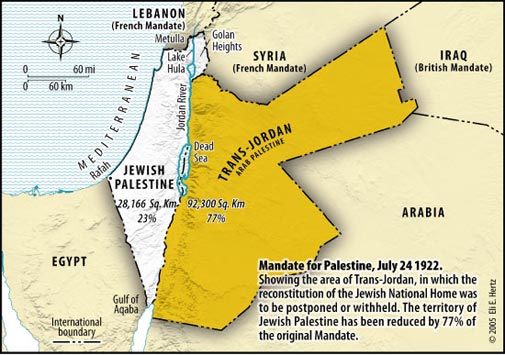King Abdullah of Jordan is nervous and for good reason.
He has publicly expressed his growing concern at the continuing power struggles, internal fighting and economic disaster occurring in Gaza and the implications this will have for the "two-state solution" sponsored almost four years ago by America, the European Union, Russia and the United Nations -- the so called Quartet.
The Quartet's proposal called for the creation of a 23rd independent Arab State within Gaza and the West Bank - the remaining 6% of the former League of Nations Mandate for Palestine unallocated between Israel (17%) and Jordan (77%).
The Quartet has suffered acute embarrassment and loss of face as the plan still remains unimplemented in even one small detail, whilst Arab intransigence continues to deny any claim by Israel to even one square kilometre of this territory.
Even worse, the Quartet's diplomatic failure to get the process up and running has exposed it as a toothless tiger in the face of resurgent Arab nationalism and mounting Islamic terrorism worldwide.
Seeking to create yet another Arab State within all or part of the West Bank and Gaza - an area of just 6200 square kilometres -- rather than dividing this territory between the 90,000 square kilometres of Jordan and the 22,000 square kilometres of Israel has proved to be an error of disastrous proportions.
The Quartet endorsed the claim that the Arabs living in the West Bank and Gaza were entitled to a separate State of their own even though they were no different in religion, language or culture to their brethren and families living less than one hour's drive away.
Additional Arab League demands for the transfer of 400,000 Jews back to Israel, as well as the return of millions of Arabs or their descendants to Israel displaced as a result of the War in 1948 effectively ended any possibility of the Quartet's plan ever succeeding.
Now King Abdullah has had enough and has firmly spoken out against these failed Arab policies.
In an interview published in the Khaleej Times on 11 October 2006, King Abdullah declared:
"I really think that by the first half of 2007 we might wake up to reality and realise that the two-state solution is no longer attainable, and then what?"
He gave further vent to his frustration by saying:
"I think we are really running out of time. Physically, on the ground and geographically, I think there is less and less of a West Bank and Jerusalem to talk about"
He warned:
"We want to go back to the 1967 borders. We are talking about that today. Are we going to talk about that tomorrow though? This is the danger."
King Abdullah recognises that compromise with Israel to achieve the Quartet's two-state solution will involve the return of something less than the entire West Bank and Gaza.
His view will not resonate well with the Arab League, which is in no mood to moderate its extreme and totally unrealistic demands.
If the two-state solution falls by the wayside as a result, King Abdullah is clearly fearful that another war might break out that could involve Jordan and even possibly lead to an attempt to overthrow his rule in Jordan as radical terrorist groups seek another springboard for their assault on Israel.
The rapidly deteriorating conditions in Gaza and the threat of civil war there spilling over into the West Bank could well see Jordan and possibly Egypt intervening with Israel's support to oust the Hamas Government in Gaza, restore law and order and regain international financial support to assist and rehabilitate the Arab populations of the West Bank and Gaza to live in peace among themselves and with their neighbours.
This could ultimately involve what should have been the Quartet's objective in the first place --the division of sovereignty in the West Bank and Gaza between Israel, Jordan and possibly Egypt.
This is and has always been the only possible solution for the West Bank and Gaza.
It is a pity that international and Arab diplomacy for the last 13 years has totally focused its efforts on imposing another Arab State between Israel, Jordan and Egypt.
King Abdullah now fears this diplomacy will come to naught by the first half of 2007.
If this indeed happens, then the opportunity must be taken by Israel, Jordan and Egypt, with the assistance of the Quartet, to restore some sanity and reality by creatively resolving a conflict that has defied everyone's best efforts for the last 125 years.

No comments:
Post a Comment